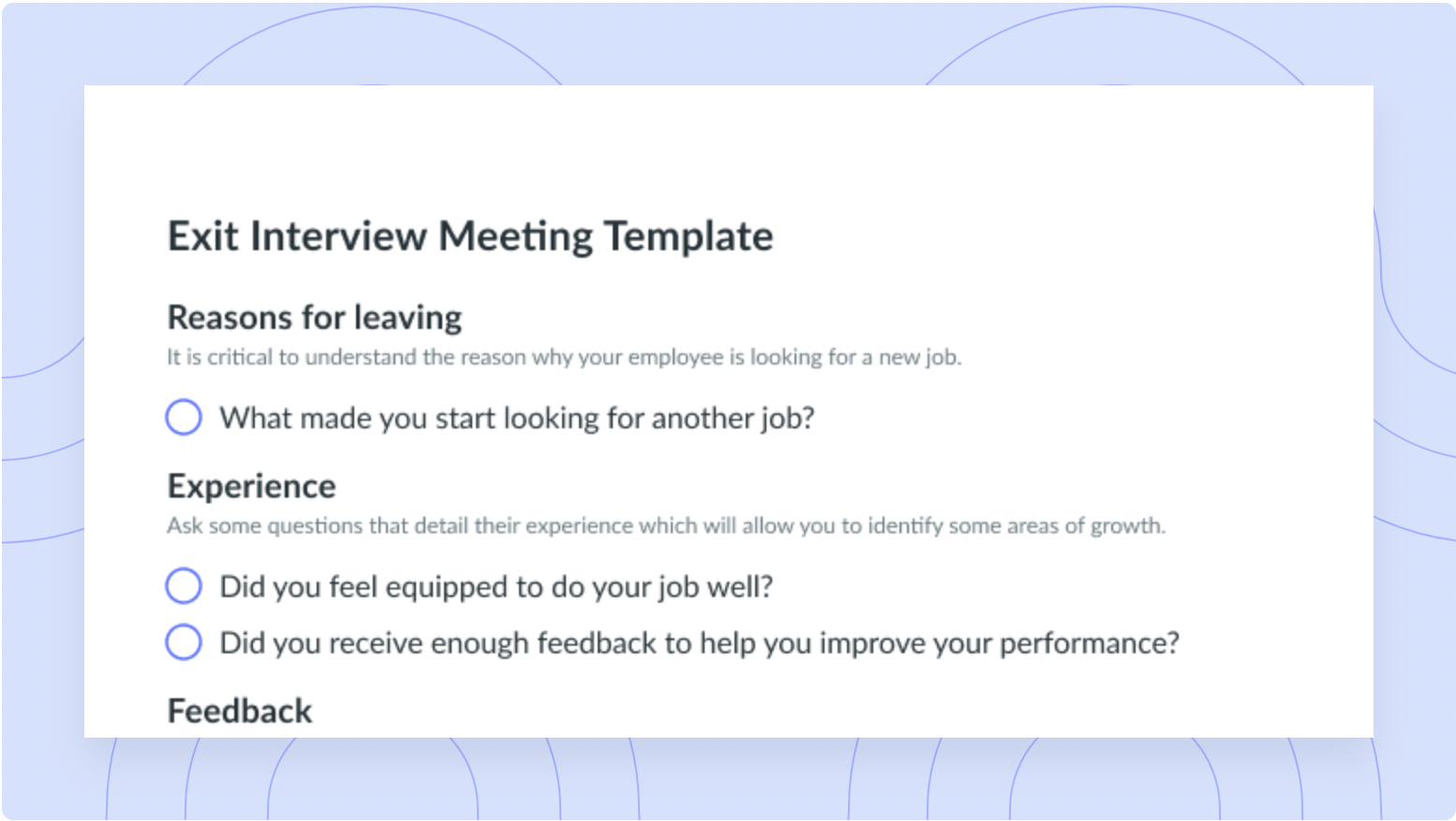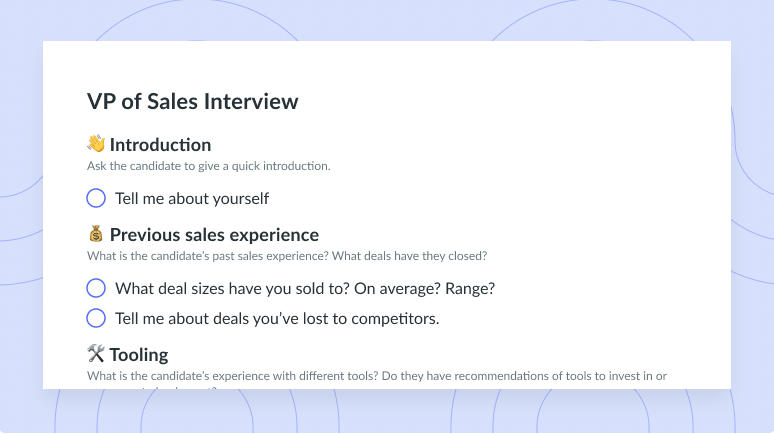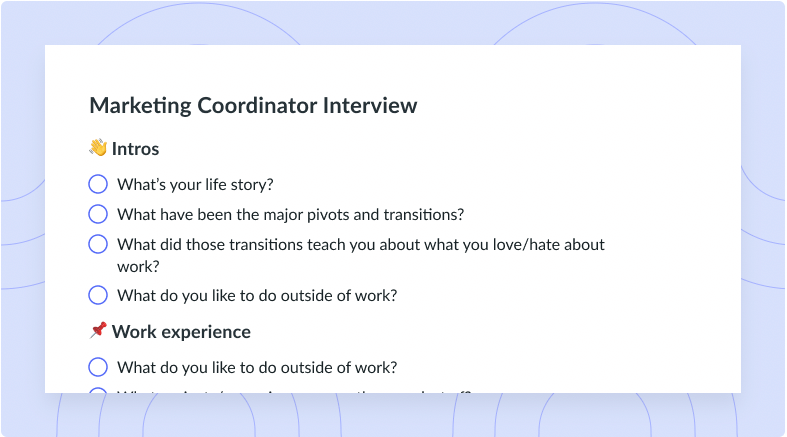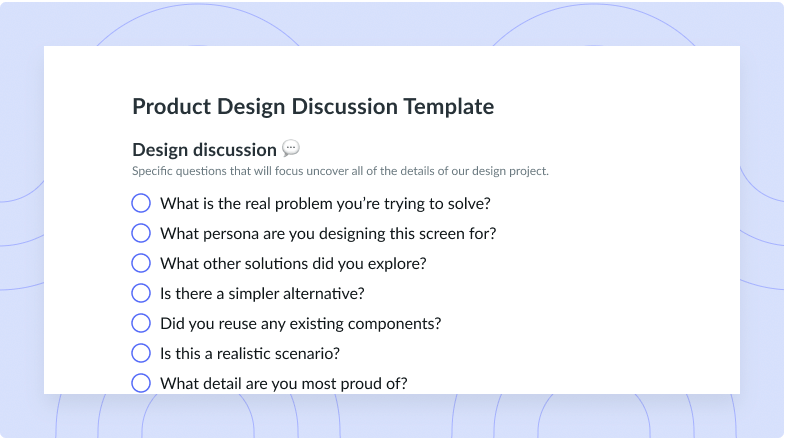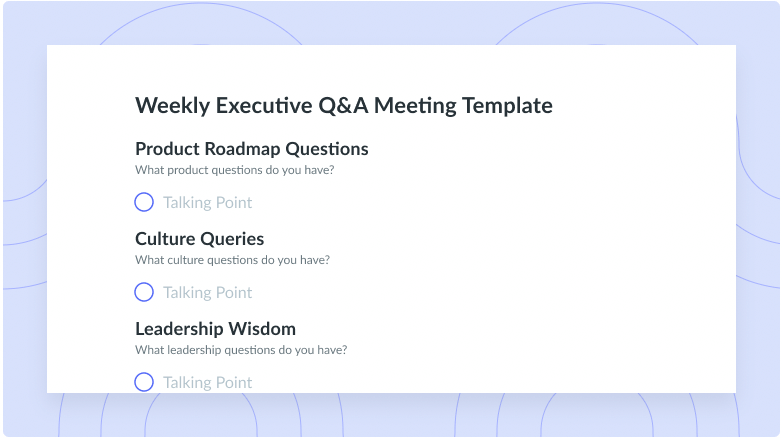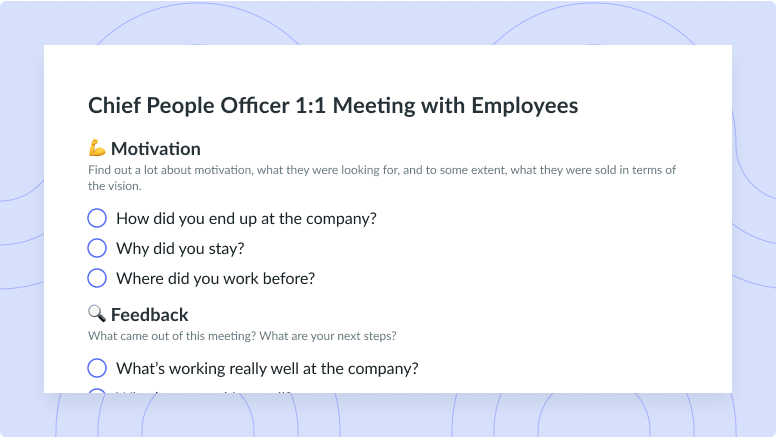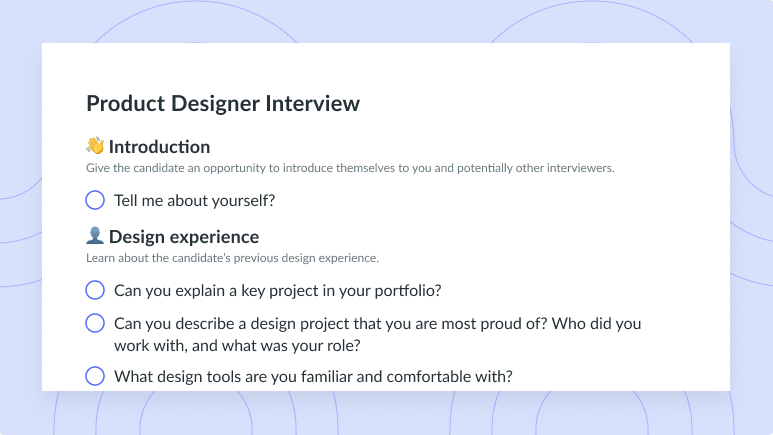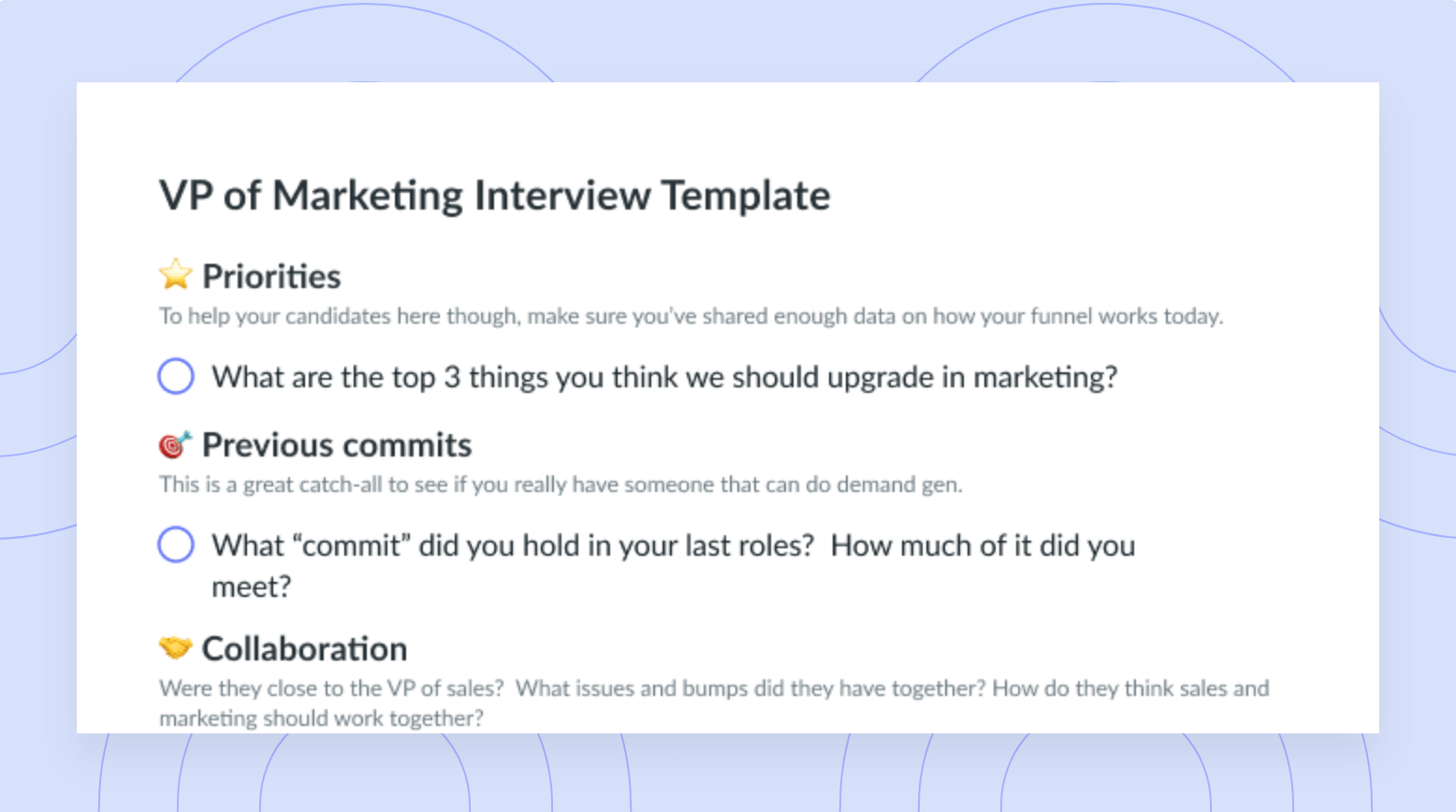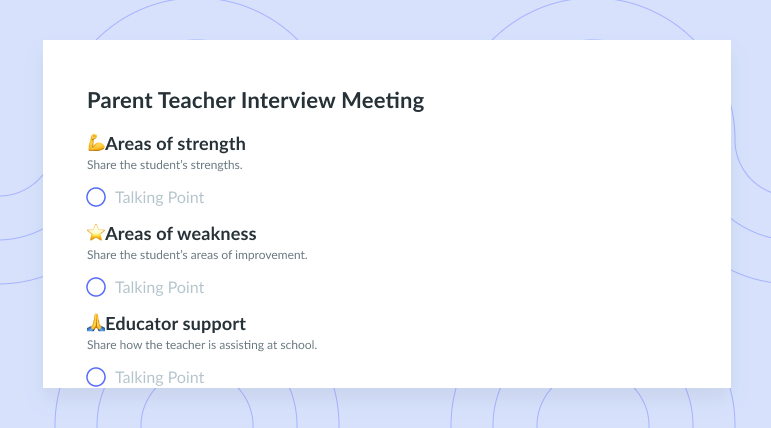30 Must-Ask Exit Interview Questions for an Effective Offboarding Meeting
Hosting a successful exit interview can benefit both the employees and the company. Ask these questions for the most insight!
According to Harvard Business Review, exit interviews teach the company why the employee stayed for the time they stayed for, why they decided to leave, and how the organization can change for the better. “A thoughtful exit-interview (EI) process can create a constant flow of feedback on all three fronts.”
If you have an upcoming exit interview, check out this list of exit interview questions and best practices to ensure a respectful and informative meeting before the employee departs.
- What is an exit interview?
- 30 must-ask exit interview questions
- Best practices to nail exit interview questions
- Exit interview meeting agenda template
What is an exit interview?
An exit interview (EI) is typically conducted by human resources, the employee’s managers, or an external consultant done before an employee departs the company for a variety of reasons. According to the same Harvard Business Review article, EI’s conducted by second or third-line managers lead to the most action, and second-line managers typically receive the most honest feedback.
Hosting exit interview questions offers a lot of insight if done correctly. Asking the right questions will give the employee a chance to explain their reasoning for leaving, offer insight into company culture, and even suggest what could be improved or what needs to change. These interviews should be respectful and end on good terms with the employee and individuals conducting the meeting.

Send an agenda beforehand
Have questions prepared before the meeting so attendees have time to think of their responses and contribute their own talking points to the agenda.

30 must-ask exit interview questions
Now that you know what an EI is, let’s look at some questions you should be asking…
Employee experience
Knowing how an employee’s experience was while working at your company will give you insight into how they felt about their job. This is important because it will showcase the areas of strengths that the job/position offers and the areas of weaknesses that the job/position has.
Here are some examples of questions that will help you understand the employee’s experience:
- What was your favourite and least favourite part about your job?
- Do you believe that you were fairly paid for your job? If not, should you be paid more or less?
- Was your job what you expected it would be upon your hire?
- Did your job change while working here? If so, did you like or dislike this change?
- Did you feel that helpful feedback was given to you?
- How would you rate your experience from 1-5 as an employee at [company name]?
Company culture
Having a good company culture is extremely important. Thus, it’s essential to ask questions about the culture at your company to understand from the employees’ perspective.
Here are some examples of questions that will showcase how employees feel about your company culture:
- Did you feel that your team created a safe place for you?
- Did you feel supported by your team?
- Did you get along with your colleagues?
- How would you rate from 1-5 the culture at [company name]?
- Did you ever feel discriminated against at work?
- Did you feel like a valued employee?
Growth opportunities
Workplaces should provide employees with opportunities to grow. This will help both the employee and the company. So, asking questions about growth opportunities is vital during an EI.
Here are some examples of questions that will help you understand the employee’s growth opportunities while working at your company:
- Did you have the opportunity to advance in this company?
- What did you learn from this job?
- Did you achieve your aspired goals in this job?
- Were you supported in achieving your goals?
- Is there anything this job could have done differently to help you achieve your career goals?
- What are your overall career goals, and how did this job align with them?
Manager feedback
Frequently employees are reluctant to give feedback on their managers because they are superior to them. However, it’s important to routinely review managers’ performance to ensure that they’re effectively doing their job. And one way to gain knowledge on managers is by asking for manager feedback during EI’s.
Here are some examples of questions that will help you gain manager feedback:
- Did your manager provide you with the needed resources to successfully complete your job?
- Did your manager assign clear objectives?
- Did your manager provide constructive feedback?
- Were you comfortable talking with your manager?
- What is one thing your manager could improve on?
- What is one thing your manager excelled in?

Reasons for leaving
Everyone has their reasons for leaving a job. And some of these reasons may relate to the company/job, and some may be solely due to personal reasons. However, asking what made the employee decide to leave is important to gain information on issues in the company. This is also important because it allows the company to address any problems to create a better workplace.
Here are some examples of questions that will help you understand the employee’s experience:
- What prompted you to leave this job?
- If you got a new job, what benefits does it offer you that this job did not?
- Would you consider returning to this company in the future?
- How could this job be altered in the future?
- Did you like the size of the company and the size of your team?
- Were any issues you had while working here brought up to anyone at any point? If so, were they addressed?
Best practices to nail exit interview questions
According to Everett Spain and Boris Groysberg, Harvard Business Review contributors, there are 5 things that employers should consider when conducting EI’s to ensure that they’re effective:
1 Timing
One mistake that employers make is conducting the EI too long after the employee has left the company.
“The most productive moment to conduct the initial EI is halfway between the announcement of an intention to leave and the actual departure—after the initial rush of emotion has died down, but before the employee has checked out mentally,” says Spain and Groysberg.
Spain and Groysberg also suggest conducting an EI about a month after the employee has left the company. This approach allows the employee time to relax and think about why they left and how the company can help current and future employees.
2 Frequency
Another important thing that Spain and Groysberg suggest considering is how many EI’s you do. “Many experts advocate conducting one interview while the employee is still there and one a few months after departure as an effective way of getting forthright response,” says Spain and Groysberg.
3 Method
Spain and Groysberg explain that there are different benefits to the different ways of conducting an EI. For example, they note that face-to-face interviews are known as the best way to create rapport, while telephone interviews can produce more honest answers by interviewees.
Additionally, Spain and Groysberg suggest using various methods when conducting multiple EI’s. “We believe that telephone interviews and web surveys are typically best used as complements to face-to-face interviews, and that at least one in-person interview is essential to promote long-term ambassadorship.”
4 Structure
If you’ve landed on our page before, you’d know that Fellow preaches structure. A meeting agenda helps keep your meetings structured, producing effective outcomes. Similarly, a structured EI is important to ensure effective outcomes.
Pro tip: Use a meeting agenda template to get the most out of your EI.
5 Manner
According to Spain and Groysberg, an interviewer should ensure that they listen more than they talk. It’s also important to avoid displaying authority when speaking to the interviewee. Further, Spain and Groysberg suggest that interviewers ask some open-ended questions to prompt more discussion.
“They should be patient and friendly, occasionally asking open-ended questions and speaking only enough to prompt the interviewee or steer the discussion toward an important topic.”
Exit interview meeting agenda template
With the right exit interview meeting agenda template, you can enhance career development practices, solidify company culture, and uncover any issues that you may not be aware of. Try out Fellow’s exit interview template here!
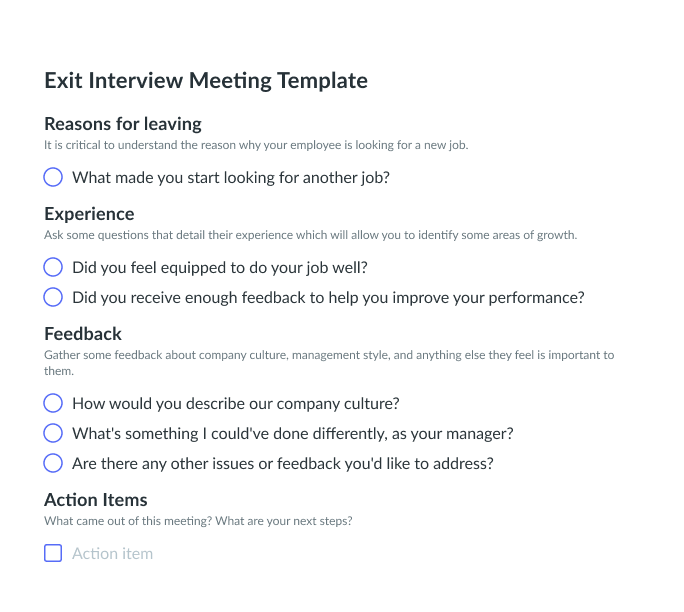
Parting advice
At the end of the day, it’s never fun saying bye to colleagues. However, conducting an effective EI is very important. Not only will it give you insight from an employee’s perspective, but it will also showcase issues in the company. This will then provide you with the necessary information to make positive changes for current and future employees.
Pro tip: Use Fellow for your EI’s and have all of your meeting notes easily accessible in the meeting agenda. You can also create streams via Fellow to keep all your EI interviews in one space!









